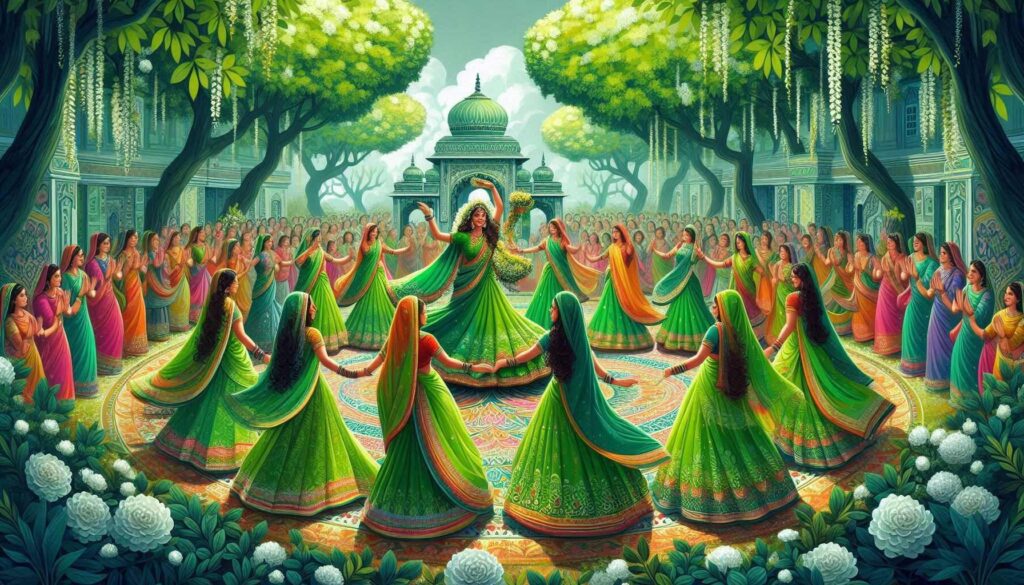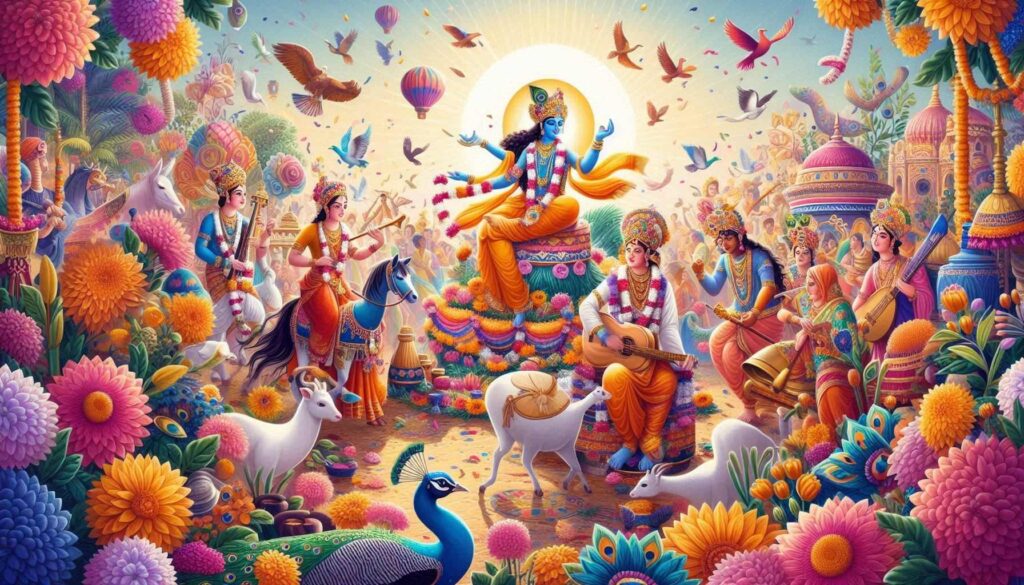Festivals in West Bengal in August 2025
West Bengal, known for its vibrant culture, historical richness, and deeply spiritual atmosphere, is a state that celebrates a wide array of festivals. August is a particularly busy month for festivals in West Bengal, marking a period filled with joy, devotion, and cultural expression. These festivals not only celebrate religious milestones but also reflect the state’s enduring connection to its traditional customs, offering insights into both the social and spiritual fabric of the Bengali community.
Read More About Hindu Philosophy
Among the most significant festivals in August 2025 in West Bengal are Raksha Bandhan, Janmashtami, Hariyali Teej, and Sree Krishna Jayanti. These festivals, which are observed by millions of people across Bengal, are deeply rooted in the cultural and spiritual life of the people, emphasizing values of family, devotion, and harmony.
1. Raksha Bandhan – A Celebration of Sibling Bond

Date: August 12, 2025
Raksha Bandhan is one of the most widely celebrated festivals in India, and it holds special significance in West Bengal as well. This festival celebrates the bond between brothers and sisters, symbolizing love, protection, and affection. The term Raksha Bandhan translates to “the bond of protection,” and it marks the special relationship between siblings, particularly the protective love of brothers toward their sisters.
Rituals and Celebrations:
- Tying the Rakhi: The central ritual of Raksha Bandhan involves the sister tying a rakhi (sacred thread) on her brother’s wrist, symbolizing her prayers for his well-being. In return, the brother gifts his sister something meaningful, often money, clothes, or sweets, as a token of his protection and love.
- Offerings and Prayers: The ceremony begins with the sister performing an arti (a ritual of light) for her brother, followed by the offering of sweets. This ritual signifies the spiritual bond between the two, and the brother vows to protect his sister, not only physically but emotionally and spiritually as well.
- Family Get-Togethers: Raksha Bandhan is a time for family reunions. Even siblings who live far away make special efforts to come together and celebrate. In West Bengal, this day is often marked by large family gatherings and festive meals.
Cultural Significance:
Raksha Bandhan transcends religious boundaries, and while it is predominantly a Hindu festival, it is celebrated with equal fervor by people from all walks of life. In West Bengal, the festival strengthens family ties and fosters a sense of unity among communities. Raksha Bandhan represents the enduring protection of familial love and the sacredness of relationships.
2. Janmashtami – The Birth of Lord Krishna

Date: August 15, 2025
Janmashtami, the festival that marks the birth of Lord Krishna, is one of the most important and widely celebrated festivals in West Bengal, especially among the Vaishnavite community. The celebration is an expression of devotion to Lord Krishna, who is revered as the eighth incarnation of Lord Vishnu.
Rituals and Celebrations:
- Midnight Worship: Janmashtami celebrations begin with fasting, and the main event occurs at midnight, marking the moment when Lord Krishna was born. Devotees engage in bhajans (devotional songs), kirtans, and other rituals dedicated to the life of Krishna.
- Dahi Handi: A key feature of the Janmashtami celebrations in West Bengal is the Dahi Handi ritual. In this ritual, young men form human pyramids to break an earthen pot (filled with yogurt or buttermilk) that is hung high above the ground. This re-enacts the playful exploits of Lord Krishna, who was known for stealing butter in his childhood.
- Bhagavad Gita Recitals: In many homes and temples across West Bengal, devotees recite verses from the Bhagavad Gita, the sacred scripture that contains the teachings of Lord Krishna to his disciple Arjuna. This day is also considered a time for reflection on the lessons of Krishna’s life.
- Processions and Cultural Programs: Temples across the state hold vibrant processions, and cultural programs featuring dance and drama performances based on Krishna’s life, such as Rasa Lila, are held to honor his divine acts.
Cultural Significance:
Janmashtami in West Bengal is an expression of pure devotion and love for Lord Krishna. It emphasizes the values of dharma (righteousness), devotion, and the importance of living a life aligned with divine principles. The festival also fosters a sense of community, with temple events and processions uniting people in shared devotion.
3. Hariyali Teej – Celebrating Monsoon and the Divine Feminine

Date: August 18, 2025
Hariyali Teej, also known as Sawan Teej, is a festival primarily celebrated by women and dedicated to the worship of Goddess Parvati. The festival is a celebration of the monsoon season, which brings renewal and growth to nature. It also marks the reunion of Goddess Parvati and Lord Shiva, symbolizing marital bliss and the union of the divine masculine and feminine.
Rituals and Celebrations:
- Fasting and Prayers: Women observe a day-long fast, praying for the well-being of their husbands or to find a good life partner. The fast is broken only after the ritual worship, which includes offerings of flowers, fruits, and incense to Goddess Parvati.
- Traditional Dance and Songs: In West Bengal, Hariyali Teej is celebrated with songs and dances in the streets. Women often gather in groups to sing traditional folk songs, celebrating the union of Goddess Parvati and Lord Shiva and the arrival of the monsoon.
- Henna Application: Women often apply henna on their hands and feet as part of the celebration. The application of henna is considered a form of blessing from the goddess.
Cultural Significance:
Hariyali Teej in West Bengal is a festival that celebrates the divine feminine and the bond between husband and wife. It highlights the significance of nature and its cycles in the Hindu way of life, reflecting the spiritual and cultural importance of renewal, growth, and unity.
4. Sree Krishna Jayanti – Celebrating the Divine Birth of Lord Krishna

Date: August 28, 2025
Sree Krishna Jayanti, also known as Gokulashtami, is another festival dedicated to Lord Krishna, particularly focusing on his childhood exploits. Unlike Janmashtami, which is the celebration of his birth, Sree Krishna Jayanti specifically focuses on his divine presence in Vrindavan, his miraculous acts, and his playful nature.
Rituals and Celebrations:
- Recitation of Stories: The day is spent listening to the stories of Krishna’s early years, especially his childhood in Vrindavan. Devotees narrate tales of Krishna’s miracles, such as his lifting of the Govardhan Hill to protect the villagers from Indra’s wrath.
- Feasting and Celebrations: Devotees prepare special dishes that Lord Krishna loved, including makhan (butter), mishri (sugar), and kheer. These dishes are offered to the deity and then distributed among the devotees.
- Krishna Plays: In some temples and local communities, small children are dressed as Krishna and Radha, reenacting scenes from Krishna’s childhood, particularly his playful interactions with the gopis (female devotees) and his divine feats.
Cultural Significance:
Sree Krishna Jayanti in West Bengal is a reflection of Krishna’s life, which emphasizes his playful and loving nature, as well as his teachings on devotion and selfless service. The festival promotes love and devotion towards God, highlighting the joy and innocence in spiritual practice


